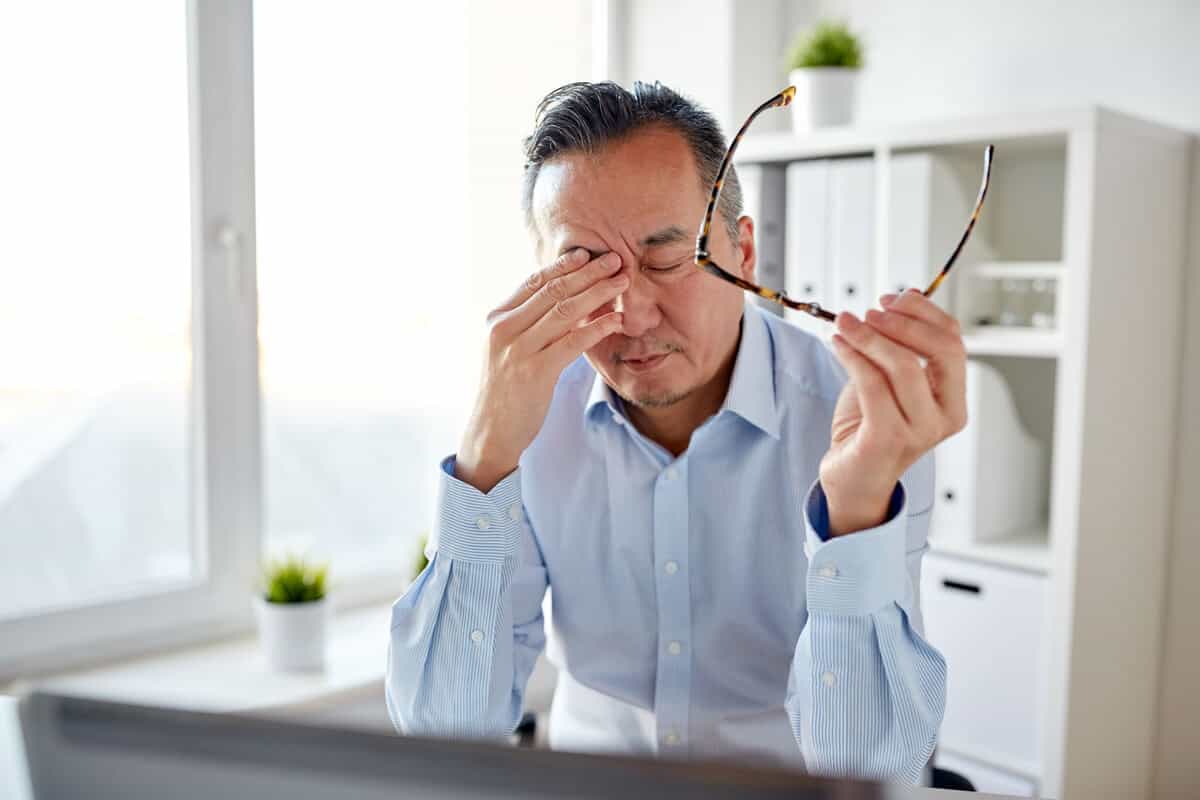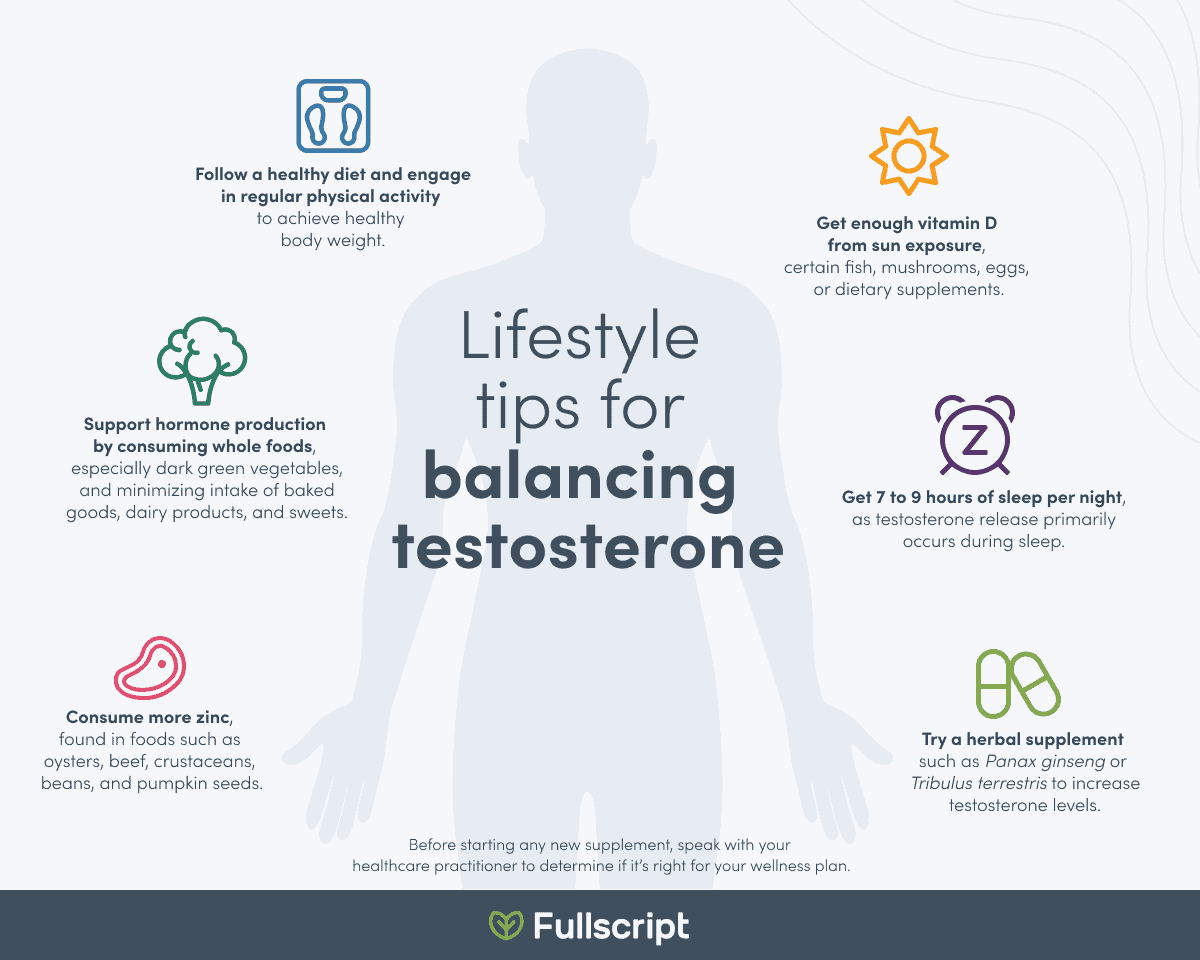If you’re a man experiencing sudden weight gain, changes in energy, or diminished libido, you may be suffering from a hormonal imbalance. Hormones are chemical messengers produced by glands within your endocrine system that tell your organs what to do and when to do it. (19) They control numerous bodily functions, from your metabolism to your mood. So it’s not surprising that even a small imbalance in your hormones can trigger unwelcome changes throughout your body.
In men, testosterone is the primary hormone. In most men, testosterone production spikes around puberty and early adolescence, then tapers off after age 30. (6) In fact, estimates show that low testosterone levels, defined as levels below 300 nanograms per deciliter, affect 19% of men in their 60s, 28% of those in their 70s, and nearly half of all men in their 80s. (14) Let’s take a deeper dive to learn more about testosterone and how an imbalance can impact your overall health.
 Even a slight imbalance in your testosterone levels can significantly impact your mood and energy levels.
Even a slight imbalance in your testosterone levels can significantly impact your mood and energy levels.
 Adopting healthy habits may help enhance testosterone production and improve your quality of life.
Adopting healthy habits may help enhance testosterone production and improve your quality of life.
 Consider these lifestyle approaches for male hormonal imbalance.
Consider these lifestyle approaches for male hormonal imbalance.

What is testosterone?
Testosterone is a hormone made in the testes and it’s the most important reproductive hormone in men. In fact, it’s the hormone responsible for a man’s deep voice and facial hair. However, the role of this hormone extends beyond your reproductive health or masculine features. Testosterone also supports healthy bones, muscle mass, and blood cell production, and can even affect where you store body fat. (4)(11)(21) A small amount of the testosterone circulating in your bloodstream is also converted to a type of estrogen called estradiol. In men, estradiol is essential for modulating libido, erectile function, and the production of sperm. (28) As your body produces less testosterone, you also make less estradiol. This can cause changes that are often attributed to low testosterone levels. (21)Did you know? Testosterone is part of a group of hormones known as androgens. Other androgens include dihydrotestosterone (DHT) and dehydroepiandrosterone (DHEA). While androgens are typically considered “male” hormones, they also play an important role in women’s health. (30)
What causes hormonal imbalance in men?
Male hypogonadism—the medical term for low testosterone levels—occurs when the body doesn’t make enough testosterone. The two basic types of hypogonadism are primary and secondary. (16) Primary hypogonadism occurs when the testes don’t produce enough testosterone to support optimal health. (16) This can be an inherited condition, such as when the testicles don’t descend before birth or when a man is born with three sets of the sex chromosomes X and Y, a condition known as Klinefelter syndrome. (3) Other causes of primary hypogonadism include:- A mumps infection affecting the testicles
- Chemotherapy or radiation treatment
- Excess iron in the blood
- Injury to the testicles (16)
- Abnormal development of the hypothalamus
- An inflammatory disease, such as sarcoidosis or tuberculosis
- A problem with the pituitary gland
- Certain medications, such as opioids and steroids
- HIV/AIDS
- Obesity
- Stress (16)
Symptoms of a testosterone imbalance
Both primary and secondary hypogonadism present with similar symptoms in adult men, including:- Anemia
- Changes in cholesterol levels
- Decreased energy and stamina
- Depression
- Difficulty concentrating
- Diminished muscle mass
- Enlargement of breasts
- Erectile dysfunction
- Hot flashes
- Irritability
- Loss of body hair
- Osteoporosis
- Problems attaining an orgasm
- Reduced libido
- Weight gain (16)(22)
Diagnosing and treating a testosterone imbalance
The presence of the symptoms listed above can be an indication of a hormonal imbalance. To verify this, your integrative healthcare practitioner may conduct a physical examination and order blood tests to measure hormones such as total/free testosterone, estrogen, progesterone, luteinizing hormone (LH), prolactin, and sex hormone binding globulin (SHBG), as these factors can affect your testosterone levels. (5)(20)(33) Normal testosterone levels in men range from 264 to 916 ng/dL. (31) If your levels are below 300 ng/dL, your practitioner may order additional tests to determine the underlying cause. (5) The standard treatment for low testosterone levels is testosterone replacement therapy. While this type of treatment may improve mood, bone mineral density, muscle mass, libido, and the ability to achieve and maintain an erection, it can also come with potential side effects, such as liver toxicity or exacerbation of other conditions, including benign prostatic hyperplasia (BPH or enlarged prostate) and cardiovascular issues. (2)(5) Additionally, there are many things you can do to balance your hormone levels naturally. Adopting healthy habits may help enhance testosterone production and improve your quality of life.
Adopting healthy habits may help enhance testosterone production and improve your quality of life.
Lifestyle tips for balancing testosterone
Incorporating the following lifestyle changes not only helps balance testosterone levels, they can also enhance your overall health and well-being.Aim for a healthy body weight
Studies report that overweight men who lose weight often experience the positive side effect of increased testosterone levels. A 2018 clinical trial, involving 105 obese men from a fertility clinic with an average body mass index (BMI) of 33.2 kg/m2, found that those who lost weight and reduced their BMI to an average of 30.4 kg/m2 experienced an increase in testosterone production after one year. (15) Since then, other studies have supported these findings, including one review of 24 clinical studies that appeared in the European Journal of Endocrinology. During their analysis, the reviewers found that weight loss, either through diet or bariatric surgery, increased both total and free testosterone in men. (1)(7)(12)Follow a healthy diet
Interestingly, some data also shows that the type of diet you follow can affect testosterone levels. In a study of data from more than 3,100 men using the National Health and Nutrition Examination Survey, researchers found that both low-fat and Mediterranean-style diets were associated with slightly lower than average testosterone levels. (10) According to one study in women, healthy fats like avocados or olive oil support the production of hormones, including testosterone, which may in part explain these results. (23) So it’s important to speak with your integrative health practitioner about which type of diet might be best for you.Consume more zinc
Zinc is an essential mineral for balancing testosterone levels and maintaining the health and integrity of sperm. (9) Since your body can’t store zinc, deficiency of this mineral is common. However, one small study conducted at Wayne State University in Detroit found that correcting a zinc deficiency doubled testosterone production in elderly men. (27) Easy ways to ensure you’re consuming enough zinc is by eating more zinc-rich foods, including red meat, shellfish, nuts and seeds, dairy, and legumes. (24)Add some vitamin D
Increasing your intake of the sunshine vitamin may help increase your testosterone levels and improve sperm quality. (32) One study involving 165 male participants reported that the men taking a daily dose of supplemental vitamin D experienced a significant increase in their testosterone levels. (26)Get enough sleep
According to a study in the Journal of the American Medical Association, even five days of sleep deprivation can cause a 10% to 15% drop in a man’s testosterone levels. (17) Strive to get the recommended seven to nine hours of shuteye every night to support a healthy testosterone balance. (29)Try a herbal supplement
Pairing healthier habits with a supplement providing medicinal herbs such as Panax ginseng, Tribulus terrestris, and Lepidium meyenii (maca) can support hormonal balance and better overall sexual health in men. Studies show that Panax ginseng and Tribulus terrestris elevate testosterone levels. (8)(18) Maca, on the other hand, doesn’t impact a man’s hormonal balance but can enhance libido and support sexual function. (13) Before starting any new supplement, speak with your healthcare practitioner to determine if it’s right for your wellness plan. Consider these lifestyle approaches for male hormonal imbalance.
Consider these lifestyle approaches for male hormonal imbalance.

